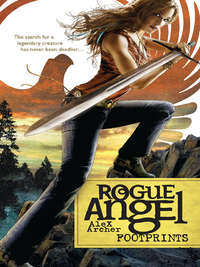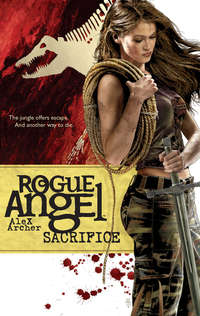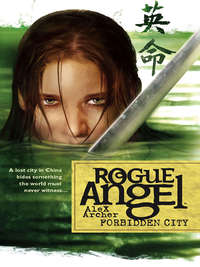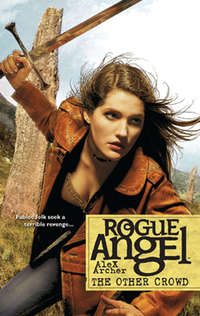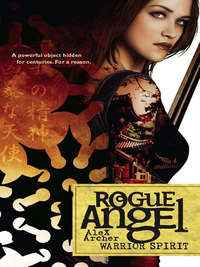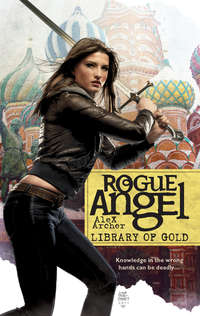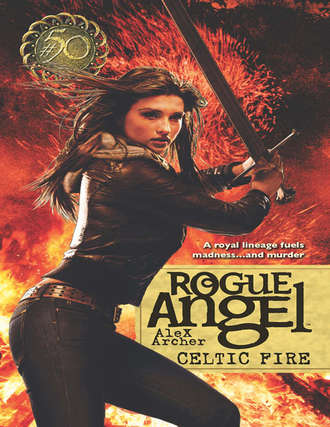
Полная версия
Celtic Fire

A sword, a stone and a deadly legacy…
The theft of a whetstone from a Welsh museum and the murder of a curate during a grave robbery seem, at first, like random crimes. But the troubling deeds are linked by a precarious thread. An unusual collection of rare and scattered British antiquities has become a target—and the relics’ value lies in something much more dangerous than money….
Annja Creed, archaeologist and host of television’s Chasing History’s Monsters, is in the U.K. when her mentor, Roux, interrupts her sojourn with news of the thefts. He’s certain that the thirteen Treasures of Britain are wanted for their rumored power. Roux tasks Annja with locating and protecting the treasures before the wrong person finds them, meaning she must stand against a woman fueled by madness and the fires of her ancient Celt blood—and a sword as powerful and otherworldly as Annja’s own.
“There’s already been enough death. So just put the sword down…”
But Awena wasn’t prepared to give up on her vengeance. She wanted Annja to pay, and lunged at her, slashing wildly. She had no skill with the weapon, but pure rage still made her more than dangerous.
Annja parried blow after blow, fending off the attacks, knowing that like any fire, Awena would burn herself out. She didn’t have the stamina to match Annja, even if the blade somehow imbued her with unholy strength.
Again Awena swung, coming at her, but the intensity of the attacks lessened as she tired. Annja felt the strain, too. The muscles in her sword arm burned where it had been touched by the blue flame.
Annja blocked each parry, swords ringing out as they clashed.
Tears streamed down Awena’s face. She seemed to shrink in on herself, drawing a shallow breath before launching the next blow.
Annja knew that this was the moment to strike.
One chance. One opening. That was all she needed.
She had to end this now….
Celtic Fire
Alex Archer

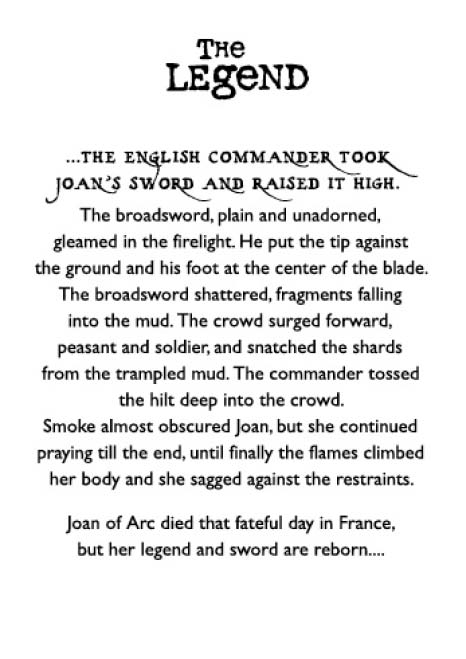
Contents
Cover
Back Cover Text
Introduction
Title Page
The Legend
Chapter 1
Chapter 2
Chapter 3
Chapter 4
Chapter 5
Chapter 6
Chapter 7
Chapter 8
Chapter 9
Chapter 10
Chapter 11
Chapter 12
Chapter 13
Chapter 14
Chapter 15
Chapter 16
Chapter 17
Chapter 18
Chapter 19
Chapter 20
Chapter 21
Chapter 22
Chapter 23
Chapter 24
Chapter 25
Chapter 26
Chapter 27
Chapter 28
Chapter 29
Chapter 30
Chapter 31
Chapter 32
Chapter 33
Chapter 34
Chapter 35
Chapter 36
Chapter 37
Chapter 38
Chapter 39
Chapter 40
Chapter 41
Chapter 42
Chapter 43
Chapter 44
Chapter 45
Chapter 46
Chapter 47
Chapter 48
Chapter 49
Chapter 50
Copyright
Chapter 1
Clouds covered the moon. The garden was in near-perfect darkness but for the ambient orange glow of the streetlights pushing at the edges of the shrubbery. Deep among the medicinal herbs there was nothing but shadow. A short distance away two cats fought, hissing and squealing as they duked it out over territorial rights for a scrap of land not worth the urine it took to mark it. And among those deep shadows in the darkest part of the garden, the woman in black let out an almost-silent breath she’d held a second longer than was comfortable.
Awena had walked the narrow paths between the flower beds every day that week, admiring them, passing comment to the gardeners and tourists as she went, making sure that she knew every inch of them. There was no way she was going to stumble into a replica urn or turn her ankle on a shallow border or do anything else to cause undue commotion. A certain amount of noise would get put down to badgers and foxes and other nocturnal scavengers, but a woman crying out—no matter how strangled her cry—only ever sounded like a woman crying out. It was the kind of sound hardwired deep into the human psyche to draw the attention of heroes, especially after the sun went down.
The last thing she needed was any heroes.
The garden was only a brisk five-minute walk from the police station, though through a geographical and town planning quirk it was longer if a car was sent thanks to the twisting one-way streets.
She was playing the law of averages. First responders would instinctively check the front of the building before making sure the perimeter was secure, then eventually make their way over the wall she had climbed and into the garden at the rear. Each action bought her a few precious extra seconds to do what she’d broken into the garden to do.
Lights still burned at the front of the museum, small halogen spotlights meant to entice casual passersby visiting the town in the evening, their glow saying Stop, look around, marvel at the glass display of the frontage and the great pillars of the portico, imagine what it’s like inside. A notice promised free entry, with opening times from ten in the morning until five in the afternoon, Monday to Saturday, and from two on Sunday afternoons. It was an imposing building, even in the dark. More so in the dark. It was a mixture of classical Roman and modern architecture. At the rear of the main building stood the Roman garden and a smaller entrance that was invisible to casual prying eyes.
She moved silently, feet ghosting across the ground with the lightest of steps, her black trainers, black jeans and sweatshirt making her almost invisible in the darkness. A navy blue woolen hat kept her hair tucked out of sight and gloves ensured that there would be no fingerprints to give her away. It was all in the planning. Be methodical. Take no unnecessary risks. Idiots took risks. Idiots thought it was cool to make stuff up on the fly and improvise. Awena was not an idiot. The lock wasn’t going to be a challenge. As far as the world was concerned there was nothing in there worth stealing. She knew different.
It was a calculated risk: trying to avoid setting off the alarm would only slow her. It would also make the job exponentially more difficult. She knew exactly how long she had from the moment she deliberately tripped the alarm to the second she disappeared into the night, knew exactly what she was looking for, where it would be and how to get out of there before the first responders were even in their cars.
She broke it down into segments.
Ninety seconds to break the lock—it was fractionally longer than it had taken for her to crack an identical one at home, but then that hadn’t been in the dark. Pressure situations added a few seconds. The risk came as those seconds added up.
One hundred and twenty seconds from opening the door to be in and out before anyone came running. Another sixty seconds to get her treasure to the car—which was parked on the other side of the wall—and a final seventy-five seconds to move the car to a carefully chosen parking bay where no one would notice it.
Two hundred and fifty-five seconds.
There were few houses close by. None overlooked the garden. It was unlikely that even the nosiest of parkers would be out of their beds and twitching their curtains because of the commotion, but even if they did all they’d see would be a car driving away. In the middle of the night a car was a car was a car, almost impossible to differentiate a Volvo from a Ford from a Volkswagen. That was what she was banking on.
Awena took a deep breath and opened the door, starting the stopwatch on her wrist, and stepped inside.
Immediately inside she heard the high-pitched whine indicating the alarm had been triggered.
These systems were set up with a sixty-second grace period for people to enter the code into the alarm box. That meant she only risked one hundred and ninety-five seconds with the escalating shriek of the alarm. One hundred and ninety-five seconds was a lifetime in the silence of a little town in the middle of the night but there was nothing she could do about that. She didn’t have the code. Once the tone changed that signified an alert had been sent to a private alarm company, the alarm company would try to ascertain if it was a genuine alarm call or a mistake, which would eat up a few more precious seconds before they contacted the police. There could be delays at any link along the chain, but she couldn’t rely on that. One hundred and ninety-five seconds, in and out. That was all she had.
Awena moved quickly, making her way into the main exhibits room. The faint glow of the streetlight outside leached through the window, bathing everything inside in its curiously otherworldly orange glow. She pulled the jeweler’s hammer from where she’d carried it tucked into her jeans. As the tone of the alarm changed to an escalating shriek, she delivered a single swing of the hammer, shattering the display case’s glass top into a million orange-filled fragments.
She ignored the cache of denarii in the broken pot and reached inside for her prize.
It was the only thing in the whole museum that held any value as far as Awena was concerned.
She lifted it out of the case.
It was heavier than she’d expected, needing two hands to carry.
When the two-minute timer she’d set on her stopwatch beeped before she was halfway across the floor she realized she wouldn’t be able to get out in time and felt a rising panic as each step seemed to take a little longer than the last. She’d planned this meticulously, down to the second, but the reality of the break-in defied all of her best-laid plans. She was going to need whichever god or devil looked down on thieves to do her a favor if she was going to get out before the police showed up. And even then she had to move quickly. But like it or not, the weight slowed her down. She hadn’t bargained on that. But then, how could she have known how heavy it would actually be?
She pushed the back door open again, leaning into it, and hitched her burden a little higher, trying to run across the gravel until the fire in her legs became too much to bear. The alarm grew progressively louder. Every dog in the neighborhood tried to compete with it. She couldn’t hear anyone shouting to silence them. She couldn’t hear any footsteps or wailing sirens of police cars.
Perhaps someone was looking out for her, after all.
Awena staggered the last few strides to the wall, and as much as she wanted to drop her burden, at least for a moment to catch her breath, she knew if she did there was no way she’d get it up and over the wall. Momentum was vital. All she could do was grit her teeth against the rising tide of agony and push on until she’d strained every single muscle in her body to lever the treasure up and onto the top of it.
She braced herself against the wall, balancing the treasure while she struggled to catch her breath, then hauled herself up and rolled off the wall onto the roof of her Land Rover. She’d parked it right up against the rear wall. It meant leaving tire tracks, but she’d switched the wheels out that evening, using a set of radials meant for a much smaller vehicle. She’d switch them back tomorrow. Awena lay on her back looking up at the moon as clouds drifted across it, then pulled the weight after her, putting it onto the roof beside her, then slid down the side of the car. She’d lost track of time. She couldn’t waste so much as a single second checking her watch.
She managed to get her prize into the Land Rover—hiding it on the floor behind the driver’s seat—just as she heard the sound of a siren in the distance.
Even with the weird night acoustics of the town, she could tell the patrol car was still making its way through the one-way streets. Close but no cigar, she thought, grinning for the first time that night.
She fired the engine up and threw the car into first, pulling away from the grass verge without turning on her lights.
The police siren was closing in, but instead of turning right and following the road out of town, she drove straight across into Broadway, a narrow lane that led only to the Roman amphitheater and the rugby field. There, without so much as a streetlight to guide the way, she had no choice but to turn on the lights so she could navigate what amounted to a dirt track.
It was a calculated chance. She knew how the police thought. They’d expect her to run. Hiding in plain sight wasn’t in their playbook. Hiding out in the parking lot outside the old Roman amphitheater was not logical, so it was her best shot at getting away with the robbery. She’d watched the parking lot over the past week, making sure that it wasn’t unusual for cars to be left overnight. Every night there’d been a handful of motors in there, left by people who’d spent the evening in the rugby club and decided to return to collect their car in the morning.
She pulled into a space beyond the last vehicle and turned off the engine.
She sank back into the soft leather bucket seat and closed her eyes, tension flooding from her body.
She’d done it.
She gave herself a minute to savor the fact, then climbed onto the backseat and settled herself beneath a picnic blanket to wait for morning.
Chapter 2
Daybreak began somewhere over the horizon.
The faint glow in the sky signaled the start of the day.
For the curate, there was more than enough time before the 8:00 a.m. service to unlock the doors of the cathedral and make the preparations for Communion.
He hurried along the path in the slowly brightening gloom, enjoying this time of the morning as he always did, when God’s glory was there for all to wonder at. He was a simple man who enjoyed simple pleasures. Anyone who had ever heard him in the pulpit knew that. The curate crossed the old wooden footbridge spanning the brackish water of the narrow River Alyn before it moved out to the sea. The man in the shadows knew that it wouldn’t be long before he arrived—the curate was a creature of habit—and like it or not he was going to have to give up his search for now if he wanted to slip away unnoticed.
He had already spent a couple of days checking the grounds, examining individual gravestones, crossing them off on the rough map he had sketched out to be sure he didn’t return to overlapping areas of the bone garden.
But he still hadn’t found what he was looking for.
More than once he had been approached by staff and clergy of the cathedral asking if he was all right, or if he needed any help looking for a particular grave. Each time he smiled politely, said thanks but no, and they left him to wander the huge grounds. It was more attention than he wanted to draw to himself, but it was of the natural sort, in keeping with what the staff saw every day. That was the trick, to remain inside the ordinary, not to do something outside of it that would be remembered. There were tourists doing wax rubbings of some of the older gravestones, school groups being given a guided tour of the noteworthy dead and told the stories of the old town in hushed voices.
The curate’s shuffling figure drew closer, the man looking like something out of a cartoon as he held up a hand, conducting the nature around him in time with the music he was humming, and the man knew he’d have to stay where he was now until the holy man had gone inside. He was a genuinely happy man. There were so few of those in the world. He almost skipped as he came through the lych-gate, his footing sure on the cracked and broken cobblestones that lead up to the main cathedral doors. A huge weeping willow overhung the path. Its long thin dagger-leaves rustled in the breeze. To hide from the curate, the man had taken to the deep shadows the willow cast rather helpfully.
He was silent, still, allowing the shadows to shroud him. That meant he was as good as invisible to the curate.
As the curate neared he took a single slow step back, allowing the tree trunk to come between them.
When his heel came down it was on something harder than grass, but as he placed his weight on it a sound cried out.
A strange noise...
A voice calling?
The curate stopped in his tracks, his head cocked on one side as he looked directly at the man even though he couldn’t see him for the protection of the shadows.
“Hello?” The curate waited for a response, his eyes scanning the shadows for any sign of movement, which proved he couldn’t see the man hiding there. The man didn’t answer. “Who’s there?”
The man held his breath, readying himself in case the clergyman moved closer.
He would hate to have to kill him.
Mercifully he stood still, too.
He had no idea what had caused the “voice”—the sound of stone grinding against stone. Some sort of echo effect caused by being so close to the great cathedral?
“If you need food or shelter you are welcome,” the curate called. “I can get you a hot drink as soon as I have done my duties inside. Would you like that? Tea? Coffee?”
The man tried hard not to laugh.
There was something about do-gooders that brought out the worst in him. Put them in the robes of the church—which they stupidly believed gave them a cloak of invulnerability—and they were insufferable. He decided to have some fun. “I could murder a cup of tea,” he replied in a voice more gruff and deeper than his usual tone. It masked his accent. “Thank you.”
The cleric waved in his direction, the smile on his face broader than the simple act of boiling water warranted, and made for the main door of the cathedral with his keys jangling in his hand. The curate was clearly a trusting soul. But then why would he imagine the man would need anything more than that? Why would he conjure imaginary thieves intent on mugging him? Why indeed.
No doubt there were processes and procedures in place to protect the relics—triggers that would dispatch a silent alarm to the police if anyone tried to force their way inside. That didn’t concern him. He had no interest in what was inside. None of the ritualistic paraphernalia held any fascination for him. It wasn’t about value. While there was a chance that what he was searching for lay inside the building, it was a slim one because by rights it would have been discovered long ago if that was the case. No. The only thing that interested him about this particular patch of hallowed ground was a long-lost burial plot he knew must lie somewhere within the property.
And what was buried there along with the old bones was worth more to him than anything the church in Wales held precious: it was the final resting place of Giraldus Cambrensis, Gerald of Wales.
Once he was sure that the curate was inside he waited another moment, then heard other voices carrying in the air as the holy man was greeted by his brethren. The man then ran as quickly and as lightly as he could to reach the car he had parked in a pay-and-display lot tucked at the bottom of an overgrown country lane a couple of hundred yards beyond the towering spires of the cathedral.
He was intrigued by the “voice” and the curious stone that seemed to have triggered it, but it wasn’t worth the risk of returning in daylight. At least not today. A few days, maybe, to allow the curate to forget about the poor soul who was too timid to come in to claim his cup of tea.
He started the car and drove carefully through the narrow lanes and one-way system until he found himself on the road to Haverfordwest. Once he reached Solva he pulled off the road to take advantage of the unobstructed—and spectacular—view over the bay, then settled back to catch a couple of hours’ sleep.
Chapter 3
Another day, another flight, another country.
World traveler or not, Annja had flown enough long-haul flights to know she’d want nothing more than sleep when she reached her final destination, but more likely than not the room wouldn’t be made up. That was the problem with an evening departure from New York. It was great in theory, if you could sleep on the plane, but she couldn’t so she’d effectively been up all night without the joys of dancing and pounding nightclub bass to keep her going. That’d slow the whole body clock adjustment thing along with her screwed-up circadian rhythms. One thing she’d noticed was the older she got, the more difficult the adjustment was. A few years ago jet lag barely touched her.
Through the window to her left she saw nothing but cloud below her, thick, white and impenetrable.
She checked her watch. There was still about an hour until landing, which meant somewhere below her lay the endless deeps of the Atlantic Ocean. Soon enough they’d hit the change of air as they traversed Ireland. That was always an invitation to turbulence, like Greenland. It was something about the warm air and cold air colliding.
Annja had been looking forward to this trip for a while.
She’d already earmarked a bunch of places she wanted to visit to research possible segment ideas for Chasing History’s Monsters, not that she’d shared them with Doug Morrell, her producer on the show. As much as she loved Doug, there was a limit to how many times she could stomach her ideas being energetically talked over in favor of zombies and werewolves as seemed to be his usual habit.
She’d made sure there was time for pleasure included in her schedule.
There were places she wanted to revisit while she was here, places that she’d visited when she had researched the show on the legendary King Arthur, and even though she’d thought she had left little unsaid at the time there was something absolutely fascinating—and undying—about the Grail King. She wanted to revisit Glastonbury first, and climb to the top of the tor on a sunny day. She wanted to look down from the summit and imagine what it might have been like if the land around it had been flooded.
Could the tor really have been the mythical island of Avalon?
Anything was possible, of course, but she was experienced enough to put flights of fantasy out of her head. One thing Annja Creed prided herself on was that she dealt in facts. What the rest of the world didn’t know was that there were some facts that it was best they never learned.
“Orange juice?” the flight attendant asked, disturbing her thoughts.
Annja smiled and nodded, then happily let her imagination run away with her while she waited for the captain to turn on the fasten seat belts sign, indicating their descent had begun. She knew that she could spend a month over here and not see a fraction of the places she wanted to visit; the British Isles were a wealth of ruins and history waiting to be explored, of cultures to be rediscovered and ingenuity unparalleled. Her first stop on the itinerary was a place in Wales that had been getting some press on the archaeology discussion boards on the internet.
She’d first heard about the Roman ruins in the small town of Caerleon many years before, but had never had the opportunity to visit. This time she was determined to put that right. Then it was only maybe twenty or thirty miles to Caerphilly, where a wonderfully preserved medieval castle still watched over the town and a number of faithfully re-created siege engines were on display and demonstrated regularly for the benefit of tourists.


